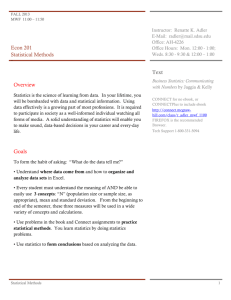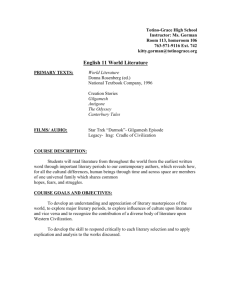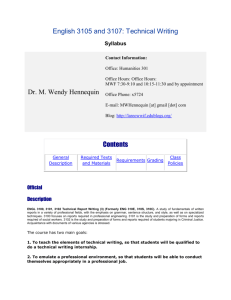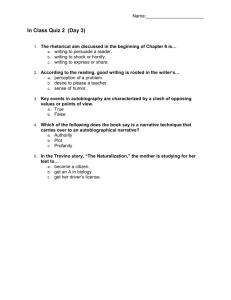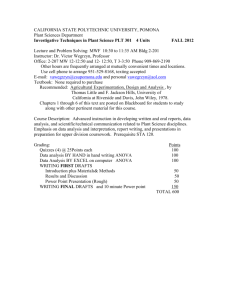ENG 1003-002 Comp. I CRN: 63304 MWF 8:00
advertisement
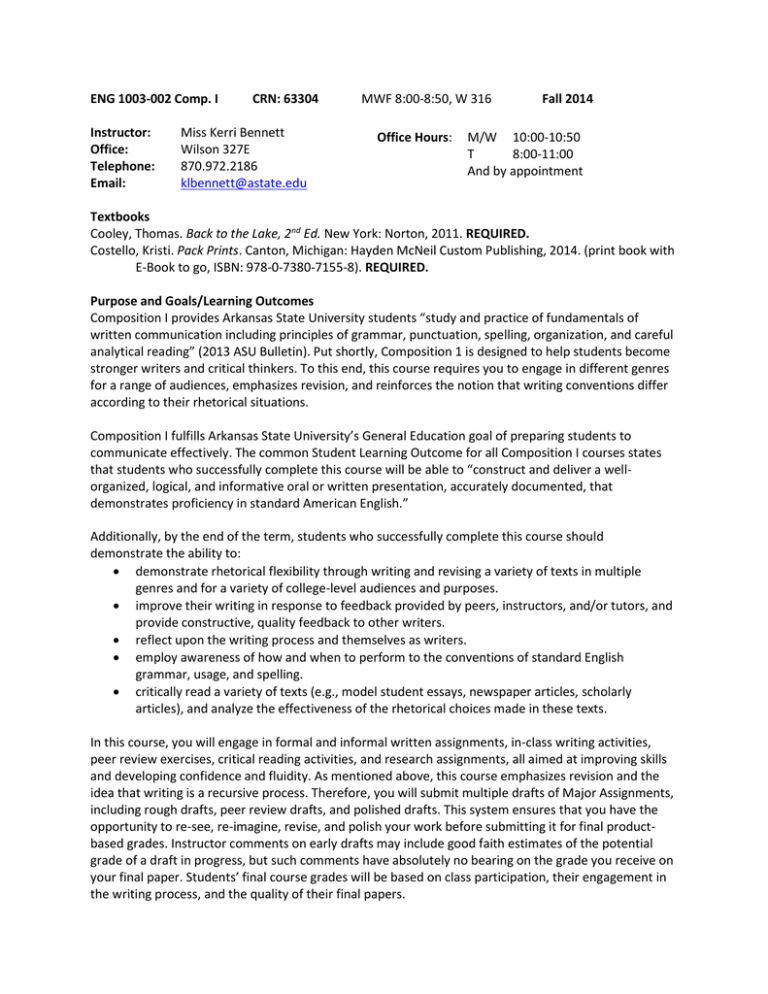
ENG 1003-002 Comp. I Instructor: Office: Telephone: Email: CRN: 63304 Miss Kerri Bennett Wilson 327E 870.972.2186 klbennett@astate.edu MWF 8:00-8:50, W 316 Office Hours: Fall 2014 M/W 10:00-10:50 T 8:00-11:00 And by appointment Textbooks Cooley, Thomas. Back to the Lake, 2nd Ed. New York: Norton, 2011. REQUIRED. Costello, Kristi. Pack Prints. Canton, Michigan: Hayden McNeil Custom Publishing, 2014. (print book with E-Book to go, ISBN: 978-0-7380-7155-8). REQUIRED. Purpose and Goals/Learning Outcomes Composition I provides Arkansas State University students “study and practice of fundamentals of written communication including principles of grammar, punctuation, spelling, organization, and careful analytical reading” (2013 ASU Bulletin). Put shortly, Composition 1 is designed to help students become stronger writers and critical thinkers. To this end, this course requires you to engage in different genres for a range of audiences, emphasizes revision, and reinforces the notion that writing conventions differ according to their rhetorical situations. Composition I fulfills Arkansas State University’s General Education goal of preparing students to communicate effectively. The common Student Learning Outcome for all Composition I courses states that students who successfully complete this course will be able to “construct and deliver a wellorganized, logical, and informative oral or written presentation, accurately documented, that demonstrates proficiency in standard American English.” Additionally, by the end of the term, students who successfully complete this course should demonstrate the ability to: demonstrate rhetorical flexibility through writing and revising a variety of texts in multiple genres and for a variety of college-level audiences and purposes. improve their writing in response to feedback provided by peers, instructors, and/or tutors, and provide constructive, quality feedback to other writers. reflect upon the writing process and themselves as writers. employ awareness of how and when to perform to the conventions of standard English grammar, usage, and spelling. critically read a variety of texts (e.g., model student essays, newspaper articles, scholarly articles), and analyze the effectiveness of the rhetorical choices made in these texts. In this course, you will engage in formal and informal written assignments, in-class writing activities, peer review exercises, critical reading activities, and research assignments, all aimed at improving skills and developing confidence and fluidity. As mentioned above, this course emphasizes revision and the idea that writing is a recursive process. Therefore, you will submit multiple drafts of Major Assignments, including rough drafts, peer review drafts, and polished drafts. This system ensures that you have the opportunity to re-see, re-imagine, revise, and polish your work before submitting it for final productbased grades. Instructor comments on early drafts may include good faith estimates of the potential grade of a draft in progress, but such comments have absolutely no bearing on the grade you receive on your final paper. Students’ final course grades will be based on class participation, their engagement in the writing process, and the quality of their final papers. Course Requirements Major Writing Assignments: Personal Narrative: This assignment asks you to write an essay that considers the relationship between a memorable aspect of your personal experience and its broader political, social, cultural, educational, or humanitarian significance. The experience can be common, intense, tragic, or even humorous, but it must also reveal its relationship to the way we negotiate our lives, our political beliefs, or our roles in society. In short, this Personal Essay should do more than tell a story; it must also reflect on a significant political, social, or cultural issue. In addition to enhancing the techniques and lessons learned in the first unit, the Personal Narrative Unit will give you practice creating well-crafted arguments supported by personal experience and enhanced with narrative techniques. Literary Analysis: This assignment asks you to closely consider a specific text. To “analyze” is to study the nature and parts [of something] by examining them individually as well as the whole [sum of the parts]. This assignment will give you practice in expressing yourself clearly and appropriately as well as analyzing texts according to their uses of rhetorical and literary devices and strategies. Position Paper: This assignment asks you to express your opinion on a public issue in an argumentative essay. A position paper contains a thesis that responds to a specific topic, provides evidence from academic sources to support that thesis, and explains how each piece of evidence supports the thesis. Because a position paper is an argument, the author is required to express an opinion and place that opinion in the context of other opinions on the same issue. You will have the option of writing your position paper in response to issues we have discussed and texts we read in class, or texts and issues you find on your own. In addition to enhancing the techniques and lessons learned in the other units, the position paper will give you practice finding, evaluating, and synthesizing secondary sources and integrating these sources into your own writing. Minor Writing/Composing Assignments: Digital Narrative: For this assignment, you will adapt your written Personal Narrative into an engaging Digital Narrative using an IPad app, PowerPoint, etc. and present it to your classmates. This assignment gives you practice adapting your writing for different mediums and presenting your work to others. Reader Response Paper: For this assignment, you will write a short paper in response to a text assigned by your instructor. This assignment introduces you to genre commonly assigned in a variety of disciplines, as well as the critical thinking, reading, and writing strategies most effective in a college setting. Rhetorical Analysis: For this assignment, you will study a visual or written text, paying attention to the argumentative appeals, including logos, ethos, and pathos that are used in it. Also consider the aspects of the rhetorical triangle (content, purpose, and intended audience) for that particular text. Then you will compose an essay explaining how these aspects work together to shape the text’s message. Academic Abstract: For this assignment, you will adapt your Position Paper into an Academic Abstract. This assignment introduces you to the conventions of academic writing that will be further explored in Composition II. Grading Scale and Course Grading: 100-90% A, 89-80% B, 79-70% C, 69-60% D, Below 60% F Essays (Major Writing Assignments): 25% of grade—Each assignment is worth 100 points. Late papers, if accepted, will be lowered one letter grade. If you need additional time to complete a paper, please inform me before the due date. Tone: The polished draft of all major assignments must be typed and submitted in MLA format, within the prescribed page length and written in the appropriate tone of voice. If an assignment is extremely informal (i.e. is written in text speech, uses excessive 1st and 2nd person pronouns, slang terms or profanity), the paper will be returned and will receive no credit. Attendance (Quizzes): 20% of grade – I reserve the right to give attendance quizzes in instances of poor/inconsistent attendance. Quizzes may not be made up. Attendance is critical for the overall grade. Participation/Preparation (Blackboard Assignments): 15% of grade–Students are encouraged to participate in class discussion and demonstrate what they have acquired from their reading of the text in these assignments. This grade may not be made up, and as such, no late Blackboard assignments will be graded. Class work (Minor Writing Assignments, etc.): 20% of grade – The class will perform various writing assignments and exercises from the text or alternative sources during class meetings. Mid-term and Final: 20% of grade Policies Behavior: This is a college course comprised of adult students. Adult behavior is expected. Academic Honesty: The student is expected to produce original work of his or her own ability. (See section on Plagiarism and cheating below. Accommodation: "Students who require academic adjustments in the classroom due to a disability must first register with ASU Disability Services.” Following registration and within the first two weeks of class, please contact me to discuss appropriate academic accommodations.* The Office of Disability Services is located in the Student Union building, Suite 2181. 870.972.3964 Attendance: I realize that you may not be able to attend all class meetings. As is standard university policy, absences totaling more than twice the number of class meetings per week are considered excessive and will result in a lower grade. More than six absences will cause students to automatically fail the course. Lateness: Please do not inconvenience your fellow students by coming to class late. While an occasional tardy may be inevitable, repeatedly coming into class late is unacceptable. Three tardies will result in an absence. Every additional three tardies will also result in another absence. Make-up Work: Permission to make up missed/returned assignments is granted at the discretion of the instructor. It is your responsibility as a student to inform the instructor of any missed assignments immediately. You are responsible for completing the work without reminders. Neglecting to make up any missing work will result in a grade of zero (0) for that assignment. Inclement Weather: In the event of inclement weather, please check the ASU website, the local TV and radio stations or KASU for campus closings. In the event that the campus is not closed and commuter students feel it is unsafe to travel, notify me through a call or email before the scheduled class meeting to avoid an absence. I may choose to cancel class even when campus is not closed and will notify the class through an email. If you suspect that such is the case, please check your ASU email account before class. Plagiarism and cheating are both serious offenses and will not be treated lightly. Plagiarism is the use of another’s work, in any form, without acknowledgement or credit of the original source and represented as one’s own. Plagiarism is not only a form of academic dishonesty, but it is also illegal and may warrant criminal prosecution. Both plagiarism and cheating in all other forms will result in an F for the assignment and may result in failure of this course and dismissal from the university. For further information, including specifics about what constitutes plagiarism or cheating, see ASU’s Academic Integrity Policy at http://studentconduct.astate.edu/AcademicIntegrity.html. Policies Regarding Technology: You need consistent access to a working computer and printer for this course, whether you use your private computer and printer or public ones; however, you alone are responsible for saving and backing up all of your written work: if you fail to do so, you risk missing course deadlines, which can lead to a lowered grade. Students are welcome to use their computers for in-class note-taking, free-writing, and other appropriate activities as long as students are on task. If a student is not on task, he/she may lose computer privileges, lose points for the assignment, or be marked absent for the day, depending on the nature of the offense. Please also note that there are times when it is simply not appropriate to have a computer out. To be sure, students should routinely ask permission before using their laptops/iPads and be prepared to put them away when asked by the instructor. Though some phones can also be used for academic tasks such as note-taking, cell-phones are not allowed to be out in class. Students who are texting, talking on the phone, searching the web, obsessively checking the time, etc. can expect to lose participation points and/or be marked absent for the day, depending on the nature of the offense. Availability: I check my ASU email several times during the hours of 8:00-5:00 M-F. After such time, I will not check it again until the following day. I can also be contacted by the phone number listed above during the hours indicated, as well as be visited in person in Wilson 327E during those hours. FERPA: “The student’s academic progress, up to and including the final grade, will not be shared with any individual other than that student or appropriate university employees without the proper documentation allowing otherwise. Grades cannot be discussed via telephone or email.”* * www2.astate.edu TENTATIVE COURSE SCHEDULE: Please note that due-dates are approximate and may be changed at the discretion of the instructor. The information below includes Major and Minor Assignment due-dates, but does not include homework and other deadlines. Additional details regarding homework and other assignments will be given in class and posted online. If you have questions, concerns, or comments, please visit the course Blackboard site or consult your instructor for additional details. Week 1: MWF 08/18, 08/20, 08/22 Introduction to each other and the course, Blackboard Tutorial, The Writing Process—Back to the Lake, Chapter 2 Week 2: MWF 08/25, 08/27, 08/29 Begin Personal Narrative Unit. Read/Discuss “Once More to the Lake” by E.B. White—Back to the Lake, Chapter 5. Week 3: MWF 09/01, 09/03, 09/05 Continue Personal Narrative Unit. Begin Digital Narrative. Back to the Lake, Chapters 4 and 5. Peer Review and Rough Draft of Personal Narrative due. Week 4: MWF 09/08, 09/10, 09/12 Continue Personal Narrative Unit. Back to the Lake, Chapters 4 and 5. Begin Reader Response. Final Draft of Personal Narrative and Digital Narrative presentation due. Week 5: MWF 09/15, 09/17, 09/19 Continue Reader Response Unit. Read/Discuss Ursula K. LeGuin’s “The Ones Who Walk Away from Omelas.” Week 6: MWF 09/22, 09/24, 09/26 Conclude Reader Response Unit. Begin Literary Analysis Unit. “A Good Man is Hard to Find” by Flannery O’Connor—Back to the Lake, Chapter 10. Final Draft of Reader Response is due. Week 7: MWF 09/29, 10/01, 10/03 (Mid-Term) Continue Literary Analysis Unit. Read/Discuss Dickenson’s “The Way I read a Letter's - this –“—Back to the Lake, Chapter 7 and Shakespeare’s “Sonnet 130”—Back to the Lake, Chapter 8. Week 8: MWF 10/06, 10/08, 10/10 Continue Literary Analysis Unit. Read/Discuss Amy Tan’s “Mother Tongue”—Back to the Lake, Chapter 9. Peer Review and Rough Draft of Literary Analysis is due. Week 9: MWF 10/13, 10/15, 10/17 Begin Rhetorical Analysis Unit. Polished Draft of Literary Analysis is due. Week 10: MWF 10/20, 10/22, 10/24 Continue Rhetorical Analysis Unit. Read/Discuss Shirley Jackson’s “The Lottery”—Back to the Lake, Chapter 11. Week 11: MWF 10/27, 10/29, 10/31 Begin Position Paper. Back to the Lake, Chapters 12 and 13. Peer Review and Rough Draft of Rhetorical Analysis are due. Week 12: MWF 11/03, 11/05, 11/07 Continue Position Paper. Read/Discuss Tripp Gabriel’s “Plagiarism Lines Blur for Students in Digital Age”—Back to the Lake, Chapter 12. Polished Draft of Rhetorical Analysis is due. Week 13: MWF 11/10, 11/12, 11/14 Continue Position Paper. Rough Draft of Position Paper and Academic Abstract are due at CONFERENCES. Week 14: MWF 11/17, 11/19, 11/21 Unit. Week 15: MWF 11/24, 11/26, 11/28 Week 16: M 12/01 W 12/03 Continue Position Paper/ Begin Conventions of Academic Writing Mini- THANKSGIVING BREAK (No Class) Final in-class Revision Assessment. (Final Exam) Polished Op-Ed & Academic Abstract due between 10:15 And 12:15 in Wilson 327E* *Students can pick up their final Op-Ed and Academic Abstract essays at the beginning of the following semester. Please note that, as these are final drafts, comments will be minimal and holistic, as opposed to formative.
